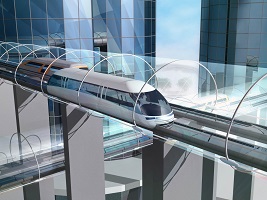A Chinese government-owned aerospace company signed a deal with Geely to work on supersonic trains. In concept, the magnetic levitation and vacuum tunnel trains are extremely similar to other high-speed rail solutions currently under development.
In partnership with China Aersospace Science and Industry Corp, Zhejiang Geely, one of China’s major automotive firms, will work towards building supersonic trains. Not all that much different from Hyperloop concepts, the trains will rely on magnetic levitation and vacuum tubes.
As an operator of the world’s longest high-speed railway, China already has good experience working with rapid transit. However, scaling up towards supersonic speeds and beyond poses some new problems that have yet to be fully worked out.
Friction between the train and the track is drastically reduced simply by removing physical contact. However, air resistance and heating of the train body becomes an issue as speeds increase. Airplanes for military use have no problem overcoming these issues, but the material costs of building a long train with similar properties would result in a mode of transportation that is still extremely expensive.
On a technicality, CASIC and Geely will not actually be hitting supersonic speeds initially. The goal is to build a train that can run at 620mph even though the speed of sound is 767mph. Future improvements to maglev technologies and drawing a better vacuum mean that the trains could theoretically surpass 2,485mph.
Geely Holding may not be a household name, but the group does have some important investments. The company holds a significant stake in Daimler and also is the current owner of Volvo Cars. Working with a state-owned firm, Geely gains access to an undisclosed amount of funding for the development of supersonic trains.
For now, details on the actual project are sparse. The agreement between the two businesses was signed at an aerospace industry show in Zhuhai, China but details of the contract have not been made public.













